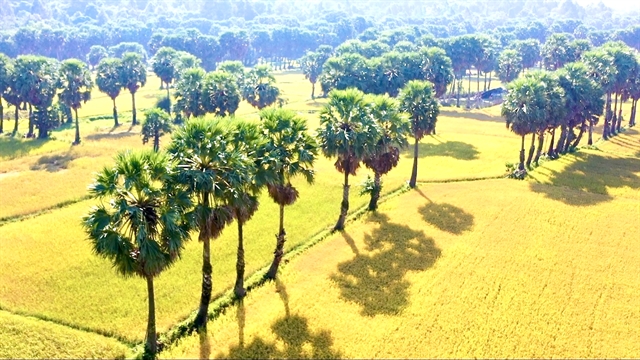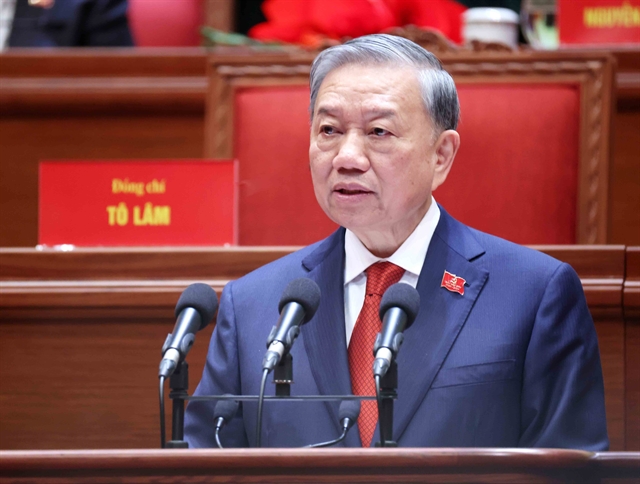 Society
Society

An Giang Province plans to expand the area under organic palmyra palm trees and linkages between various stakeholders making products from their fruit for domestic and export sales.

|
| Palmyra palm trees being planted in An Giang Province’s Tri Tôn District. – VNA/VNS Photo Thanh Sang |
AN GIANG – An Giang Province plans to expand the area under organic palmyra palm trees and linkages between various stakeholders making products from their fruit for domestic and export sales.
The province has the largest number of palm trees in the Cửu Long (Mekong) Delta, predominantly in Tri Tôn District and Tịnh Biên Town, which have more than 35,000 of them.
The palm, which can live for up to 100 years, is utilised in its entirety: The flower nectar is employed in sugar production, while the fruits are consumed fresh or used in various food products. The leaves find purpose in thatching and crafting other items.
Thriving in dry areas in Tri Tôn and Tịnh Biên, this tree serves as a source of livelihood for many Khmer ethnic people.
Harvesting its fruits and flower nectar for sugar-making remains a traditional occupation, providing essential income for the locals.
Chau Don, located in Tri Tôn’s Châu Lăng Commune, owns 30 trees and usually harvesting flower nectar between the 11th and fifth lunar months.
He manages to harvest approximately 50-80 liters of nectar daily, enough to make 15-20 kg of sugar.
Having grown up accompanying his father and others in nectar harvesting, he is used to climbing the trees.
He said this occupation supported his family's upbringing and continues to do so for his family, with he and his wife carrying on the tradition to support their two children.
Palmyra sugar, rich in vitamins and minerals, is highly sought after.
However, despite high demand, the traditional methods used by the Khmer mean quantity and quality fall short of market requirements.
To enhance quality and increase incomes for the Khmer, the province People’s Committee has approved a plan for until 2025 to zone areas for growing palmyra and produce organic products from it.
It aims to have 200 40-year-old palm trees in Tri Tôn and Tịnh Biên by 2025, with a focus on organic products.
The trees are known to produce more flower nectar as they age, with year-round fruit-bearing starting at 30-40 years.
The province's goal is to establish at least one certified production chain that links stakeholders producing and selling organic palmyra palm products by 2025.
It envisions profits from organic palm products being 1.5 – 2 times higher than from regular ones.
The province also aims for 80 percent of organic palmyra products having guaranteed company buyers by 2025 and 100 percent by 2030.
By 2030 Tri Tôn and Tịnh Biên are projected to have 500 trees for organic production, 200 trees in Tri Tôn and 300 in Tịnh Biên.
Nguyễn Thị Minh Thuý, deputy chairwoman of the province People’s Committee, emphasised that successful plan implementation involves providing knowledge about organic palmyra farming to households, co-operatives, co-operative groups, and production establishments.
The province would help them improve their farming techniques and make the transition to organic products, she promised.
It plans to pilot a model of producing organic palmyra products that involves collaboration with companies for guaranteed outlets, she said.
“The province will turn farming areas that intercrop palmyra with rice and other crops into organic farming areas.”
It aims to support the development of co-operatives and co-operative groups involved in organic palmyra growing and having linkages with companies.
Assistance will be provided for producers to create brand names, promote sales and advertise their organic palm products.
To meet export market requirements, the province will identify markets for each type of product.
Relevant departments and agencies are tasked with persuading companies to invest in producing organic palm products and collaborating with other stakeholders to sell them.
The Department of Agriculture and Rural Development and Tri Tôn and Tịnh Biên have been assigned to survey areas for establishing organic palm growing areas.
They will collaborate with production establishments for palm sugar production.
Soil and water will be tested in palm growing areas for organic certification, and the province aims to have 11 such areas by 2030.
The province has helped producers of palm products such as sugar and wine get recognition under the national "One Commune-One Product" programme. – VNS




